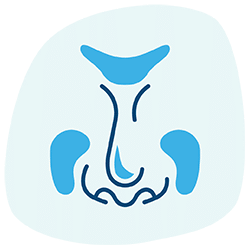On each side of your head are four spaces filled with air called sinuses. They function to make our skulls lighter and affect the sound of our voices. But their chief function is to produce a mucus material that keeps the inside of your nose moist. This moist layer of mucus protects your nose from irritants such as dust and bacteria.
When these sinuses are filled with air, you don’t give them a thought. But the moment they become clogged with mucus, you are very aware of their presence and importance in normal breathing. You also start to think about whether you have a cold or the beginning of a sinus infection.
Roanoke Valley ENT & Allergy often receives questions about and treats patients with sinus infections.
Here are some answers to questions you might have about sinuses and sinus infection treatment:
What are the signs and symptoms of a sinus infection?
Because sinus infections are so common, we often claim to have one as soon as we have a runny nose or a feeling of pressure in the forehead or behind our eyes. In fact, we might have a cold or even allergies that mimic a sinus infection. A cold can vary in the symptoms it causes and how badly it can make you feel. But typically, it will get better within 10-14 days. A lingering cold does not technically cause a sinus infection. But as the cold lingers, an infection is more likely to develop. When that happens, you will need expert sinus infection treatment.
Allergies also cause inflammation of the lining in your nose due to irritants such as pollen and dust. The symptoms that develop can be very similar to those of the common cold and a sinus infection.
A sinus infection should be suspected if your symptoms don’t resolve within a couple of weeks. The cause can be either a viral or bacterial infection of the lining of the sinus cavities. Here are the most common symptoms:
- A pressure feeling around the eyes and behind the cheeks

- A headache that continues to worsen instead of improving
- A fever
- A runny nose with stuffiness that doesn’t go away within 7-10 days
- A persistent cough
- A bad taste in your mouth
- A yellow or green drainage from your nose or into your throat
- A tired feeling that isn’t improving
Can I treat a sinus infection at home?
If you have a true sinus infection, you will eventually need to visit a medical professional. But in the early stages, you can help ease your symptoms with one or more of these treatments:
- Irrigation. Gently flushing your nasal passages can help relieve congestion and irritation. It is best to use saline solutions from a pharmacy for flushing through each nostril. If you make your own solution, use filtered, sterile, or distilled water.
- Hydrate. Drinking plenty of water helps loosen mucus and relieve nasal congestion. Proper hydration is also important in helping your body’s immune system function optimally for a quicker recovery.
- Steam. Breathing in steam can help open your nasal passages and ease your pain. This can be accomplished over a bowl of warm water or in a hot shower.
- Rest. Getting adequate rest is vital at all times, especially when your body is fighting a bad cold or infection. You may find that keeping your head elevated will help you breathe better and rest more comfortably.
How can an ENT doctor help?
If you think you have a cold, but it persists for more than a couple of weeks or suddenly gets worse after 7 days, then you need to see an ENT. Here are some reasons to visit an ENT:
- Rule out nasal polyps or other medical conditions. Nasal polyps or a deviated septum can cause sinus infection symptoms. These may need the specialized attention of an ENT.
- Prevent developing chronic sinusitis. If a sinus infection is detected and treated early, you can avoid the problems associated with a chronic infection.
- Ensure proper treatment. An ENT may prescribe antibiotics or decide that they are not necessary. This will depend on the cause of your infection. Bacterial infections may require an antibiotic. But a viral infection could actually be made worse if an antibiotic is prescribed.
Remember that at-home treatments should be discontinued if symptoms aren’t improving. A timely visit to your ENT can help speed recovery and get you feeling better quickly.
Dr. Paul Lenkowski and the Roanoke Valley ENT & Allergy team are dedicated to providing innovative, state-of-the-art sinus infection treatment to patients of all ages in the Roanoke area. With years of experience and expertise in cutting-edge sinus surgery techniques, Dr. Lenkowski is your choice for expert ENT care. Contact us today to schedule your appointment!
Paul Lenkowski, M.D., Ph.D., is a board certified Otolaryngologist (ENT) and an accomplished head, neck and sinus surgeon. He is passionate about his job and helping his patients. Dr. Lenkowski is dedicated to improving your quality of life and partnering with you to find the best-individualized treatment for your needs. His kind and pleasant demeanor along with his vast experience in the ENT and allergy field will ensure that you and your family receive top-notch care. Dr. Lenkowski earned his B.S. in Chemical Engineering from Rutgers University and went on to receive his M.D. and Ph.D. as part of the Medical Scientist Training Program at the University of Virginia. He completed his Otolaryngology Residency at the University of Iowa.

